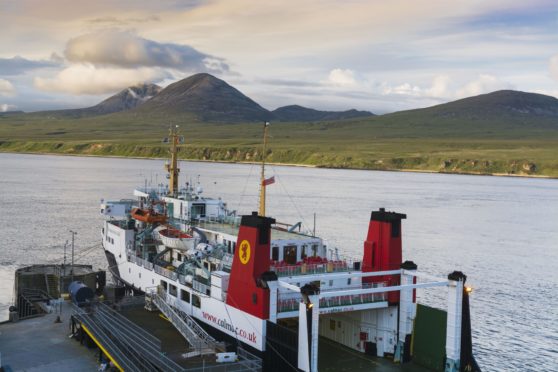
Jobs are being lost due to the chaos on Scotland’s west coast ferries, the head of Caledonian MacBrayne’s own community watchdog has warned.
Angus Campbell, chair of the CalMac Community Board, said the crisis that has come to a head in recent weeks follows a decade of under-investment that has left islands with a service so unreliable some firms are on the verge of bankruptcy.
He said: “We have had 10 to 12 years’ hiatus of no investment and now a lot of businesses are in a very dangerous position. We have already lost jobs and there is the potential to lose a lot more.”
Problems came to a head after CalMac’s £42 million Loch Seaforth broke down on the Ullapool to Stornoway route, causing a major re-shuffle of the fleet. A relief freight vessel, the MV Isle of Arran, had to be redeployed to calmer waters after failing to handle the stormy Minch and the stand-in passenger ship, the MV Isle of Lewis, was hit by technical problems that led to cancelled services.
The seven-year-old Seaforth is not due back from repairs before Friday. Two new ferries – the Glen Sannox and Hull 802 – being constructed at Ferguson Marine on the Clyde – are three years overdue and more than twice over budget and are not expected until next year.
On Friday, CalMac announced it was suspending bookings for three weeks on services for Stornoway, on Lewis; Castlebay, on Barra; and Lochboisdale, on South Uist due to problems with capacity caused by the Seaforth’s breakdown.
Campbell said: “A lot of businesses are suffering and in all sectors – not just tourism. If another ship breaks down we are in serious trouble. We have got to start building new ships, but everything is a queue behind the two ships at Ferguson’s. We also need a streamlining of organisations with clearer lines of accountability. A coherent strategy is needed now to prevent further social and economic damage to our islands.”
The board says it is self-evident the dry dock programme in place is not meeting the needs of the fleet. It also raises questions about increased maintenance, future investment, community involvement and leasing vessels.
Meanwhile, Western Isles Council has written to the first minister over the ferry chaos, also warning the disruption was tipping some businesses into closure.
Its letter said: “When you add the economic losses being generated by ferry impacts onto the losses accumulated through the pandemic, it is highly likely that a number of our smaller businesses, in some of our most fragile communities, will simply not reopen and will cease trading.
“One of our key fishery processing businesses has lost a contract in France due to their inability to deliver product to market as a direct result of ferry reliability. The wider fisheries and aquaculture sectors report that the ferry debacle is having a significantly greater economic impact on their businesses and on their ability to trade than EU exit.”
MSPs representing Scotland’s west coast island communities are also seeking an urgent meeting with Scottish ministers over the state of CalMac’s ferries.
Western Isles MSP Alasdair Allan said: “CalMac simply does not have enough vessels for there to be proper cover when ships inevitably encounter technical issues. The west coast needs additional ferries as a matter of urgency.”
Robert Morrison, operations director for CalMac, said: “As a result of the ongoing technical issues with the MV Seaforth, it has become necessary to suspend new bookings on the routes impacted up to midnight on June 7 to accommodate existing passenger bookings. For travel from June 8 onward, these routes remain open for reservations.”

Enjoy the convenience of having The Sunday Post delivered as a digital ePaper straight to your smartphone, tablet or computer.
Subscribe for only £5.49 a month and enjoy all the benefits of the printed paper as a digital replica.
Subscribe